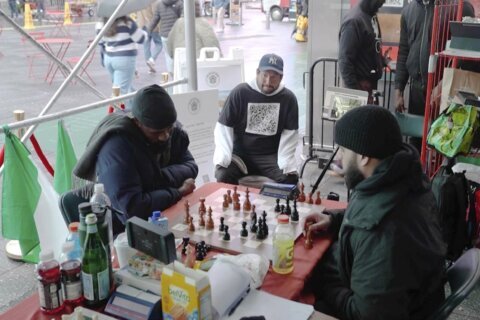The Paris police chief apologized for and justified the pepper spraying of fans and families amid the chaos that engulfed the Champions League final last month outside the Stade de France.
At a French Senate hearing looking for explanations for the organizational fiasco, Paris police prefect Didier Lallement admitted on Thursday that the evening in the suburb of Saint-Denis was “obviously a failure, because people were being pushed around or assaulted while we owed them safety.”
“It’s also a failure because our country’s image … was shattered.”
However, Lallement maintained the police were responding to the presence of tens of thousands of supporters without tickets or with forged tickets, not in the immediate vicinity of the stadium but close to the the main points of access to the venue.
“We made sure that the game was held and, most importantly, that there were no serious injuries and no deaths,” Lallement said.
Taking full responsibility for the events, he acknowledged he did not anticipate the “massive use” of fake tickets, adding the only option at his disposal to make sure people did not get crushed was the use of tear gas.
“Which is the only way to make a crowd back down except to charge them, and I think it would have been a serious mistake to charge people,” Lallement said. “I am well aware that people of good faith were gassed, and I am totally sorry for that, but I repeat, there was no other way.”
Lallement said his early estimate of 30,000 to 40,000 fans without tickets or with fake tickets might have been overstated.
“Perhaps I was wrong,” he said. “Whether there were 40,000, 30,000 or 20,000, it didn’t change the fact that there were tens of thousands of people who could not fit in.” According to the French Football Federation (FFF), 110,000 people travelled to the Stade de France, which has a capacity of 75,000.
UEFA has already started gathering evidence about issues that marred one of the world’s biggest games in sports. Real Madrid won the final beating Liverpool 1-0.
Florence Hardouin, the FFF director general, told senators that most of the fake tickets were found in the Liverpool fans’ sector. She said all of the 20,000 tickets allocated to the Reds’ supporters were in print — rather than digital — which made forgery easier.
Hardouin added that “on average, 57 fake tickets were scanned every five minutes” from 6 p.m. to 9:35 p.m. She said 66% of these 2,471 forged tickets were scanned at gates in the sector dedicated to Liverpool fans.
The FFF recommended that, in the future, only digital tickets should be available.
Liverpool mayor Steve Rotheram, who said he had personal belongings stolen at the game, challenged the French authorities’ version, saying that valid tickets were rejected because of faulty scanners.
“The argument was used to scapegoat Liverpool fans,” he told the Senate commission in comments translated into French, adding that the congestion started from the train station way ahead of the stadium.
French federation official Erwan Le Prevost said CCTV of events outside the Stade de France has been automatically deleted since judicial officials did not request the seizure of the footage within seven days. Francois-Noel Buffet, the president of the Senate’s law commission, said it would be a serious problem if images have not been requested and that a verification will be conducted.
In addition to the gassing of fans, many supporters complained about getting mugged or assaulted after the match as they left the stadium. According to Lallement, 300 to 400 individuals took part in theft and damage.
He said during his nearly two-hour grilling that unaccompanied minors were among them, but could not tell whether groups came from the Seine-Saint-Denis department, an impoverished area with high crime rates.
“There were 300 or 400 people who did not seem to be fans,” he said. “I don’t know if they were people from the housing estates around the stadium. Is this a type of delinquent population that we meet in Seine-Saint-Denis? Yes, it happens, but we also meet them in the north of Paris.”
French Interior Minister Gerald Darmanin said the violence was made possible because the police officers initially deployed in the area between the stadium and the train station were moved closer to the stadium’s gates to help disperse fans, leaving that zone without surveillance.
Lallement backed that theory. He said his decision to remove a filtration barrier to avoid a congestion of spectators allowed “undesirable” individuals to approach the stadium.
He urged fans and supporters who were assaulted or purchased fake tickets to file legal complaints.
The chaos last month prompted concerns in France and abroad about the country’s ability to host major sporting events. France will host the Rugby World Cup next year and the Olympics in 2024.
Association of Summer Olympic International Federations executive director Andrew Ryan said bringing the Olympic Games to Saint-Denis — where swimming events will take place — is a source of concern but worth the effort.
“We have to understand that sometimes we have to take risks,” Ryan said. “That is sometimes the difficult option to take, but it is the right option because if you look at that area of Saint-Denis in Paris, it is not a wealthy part of Paris at all, it is a deprived area, and so a lot of the development that is going on there for example with the aquatic center – bringing a high-level swimming center to a relatively deprived area – is a very noble thing to do.”
___
More AP soccer: https://apnews.com/hub/soccer and https://twitter.com/AP_Sports
___
Graham Dunbar in Geneva contributed to this report.
Copyright © 2024 The Associated Press. All rights reserved. This material may not be published, broadcast, written or redistributed.







